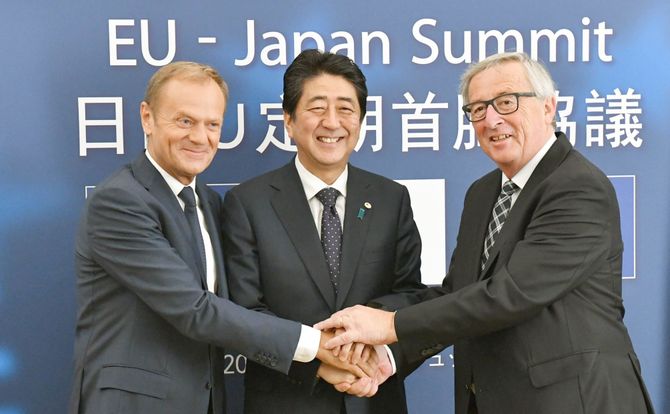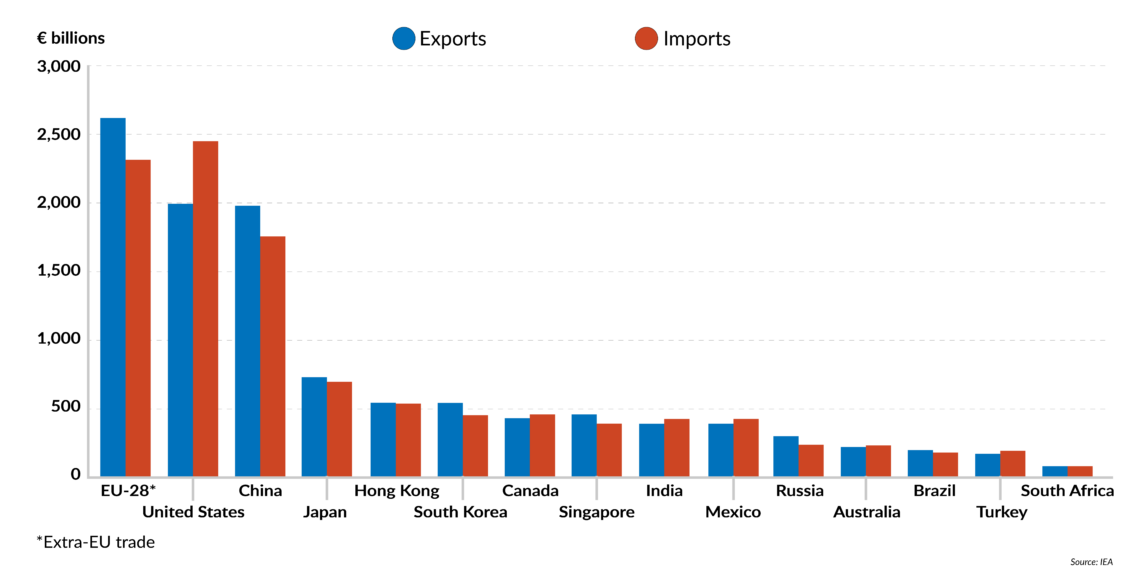Trade wars: the options for Europe
Although U.S. President Trump maintains that he believes in free trade, his policy tool remains protectionism. Europe could do more to change this, by engaging in aggressive free trade or seek bilateral deals. President Trump would be left with few justifications for trade barriers, and Brussels would acquire prominence on the world stage.

In a nutshell
- The Trump administration continues to engage in anti-free trade policies
- Europe could respond by doing more free trade
- Doing so would increase its geopolitical influence
The outlook for international trade does not look very bright. United States President Donald Trump seems determined to pursue an international order in which trade is characterized by bilaterally balanced flows between countries (U.S. and China) or between regions (U.S. and the European Union). So far, the consequences of President Trump’s recklessness have been limited. World growth prospects have not shrunk dramatically. Comparisons with the 1930s are misplaced and misleading.
This is because in today’s free-market world, the major benefits of international trade originate from the pressure companies feel from competitors (both incumbent and potential). Companies know that their survival is at risk if they fail to innovate and progress. In turn, innovation and progress produce growth.
So far, President Trump’s trade policy has not been enough to weaken competitive pressures on a global scale. The picture could deteriorate if other major players follow the U.S.’s bad example and trigger a race in which all participants lose, but myopic behavior by some could also create opportunities for others.
Let us focus on the options open to the EU, which is perhaps the region that could win or lose the most from the scenarios that could materialize as trade tensions intensify.
Multilateral solution
The easy scenario is one in which the threat of a trade war comes to nothing: China, the EU and other countries persuade President Trump that trade issues should be discussed on a multilateral basis following established rules of the game. The players involved would settle their disputes by resorting to an internationally recognized authority, the World Trade Organization, whose goal is to enhance free trade. If that happened, the WTO would reject President Trump’s requests for trade barriers, but also force the EU to reduce its own barriers and invite China to do the same.
President Trump does not think much of the collective agreements designed and negotiated by bureaucrats.
Will this happen? The short answer is “probably not,” for two reasons. First, the WTO never acted as an enforcing authority, but rather as a statistical office; and also as a meeting room where the major players reach decisions that are then forced upon the minor players. It is most unlikely that the Trump administration would choose this moment to give up some sovereignty and allow the WTO to become an authority with credible enforcement powers.
Second, it is apparent that President Trump does not think much of the collective agreements designed and negotiated by bureaucrats and technocrats. Rather, he favors face-to-face talks with the world leaders he considers influential. Thus, he is ready to exchange views with Chinese President Xi Jinping or Russian President Vladimir Putin, but he is reluctant to consider European Commission President Jean-Claude Juncker or WTO Director-General Roberto Azevedo as suitable counterparts.
Cosmetic retaliation
A second and more realistic scenario would present rising commercial tensions on three fronts: between the U.S. and China, the U.S. and its NAFTA partners, and the U.S. and the EU. What is the right response to defuse such tensions? So far, the EU has reacted to the newly erected trade barriers by resorting to cosmetic retaliation. After all, hitting motorcycles and bourbon is not going to do much harm to the American economy, especially when the production of “American” motorcycles is being relocated elsewhere.
Facts & figures
EU: global trade leader
Value of international trade in goods and services, 2016

On one hand, this soft-response strategy signals that the EU – the U.S.’s largest trading partner – is unwilling to watch idly while American trade barriers rise, and is ready to strike back if necessary. This attitude could perhaps induce America to think twice before escalating. On the other hand, it could also be perceived as a sign of weakness, encouraging President Trump to intensify his anti-trade program, a move that many American voters would probably appreciate.
If the Trump administration insists on holding to the erroneous belief that denying free trade serves the interests of the American economy, the EU will soon run out of soft responses. As mentioned above, cosmetic retaliation is an option, and not necessarily a bad one. It is mild enough not to hurt European consumers and to keep European producers under competitive pressure, but hopefully credible enough to persuade American companies to move some of their production to Europe. But it could be misinterpreted and turn out to be insufficient to defuse the protectionist bomb.
Eliminating barriers
However, a more radical option is also available, one that could definitely move the world economy out of its ominous limbo. President Trump has frequently mentioned that he is not opposed to free trade, and that his present policy aims to force America’s trade partners to eliminate trade barriers and government subsidies to privileged companies and industries.
By offering an unqualified free trade, the EU could take center stage in global policymaking.
Some may doubt Mr. Trump’s good faith. After all, starting a trade war is hardly the best way to promote free trade. Yet, it is high time that the EU did exactly what the U.S. administration hopes it will do – eliminate all sorts of trade barriers and industrial policies, including the notorious Common Agricultural Policy and many regulations that hamper mergers and raise costs for small companies and low-cost exporters.
Regardless of the American reaction, this is what Europe needs. In addition, by offering an unqualified free-trade response to protectionist threats, the EU would enhance growth throughout the old continent and acquire the prestige and credibility needed to take center stage in global policymaking. Its declared policy goal would be to emerge as the privileged counterpart of most Asian and African players, and extend its influence in general. Brussels would take the lead, forcing Washington to follow or be left in a corner.
Bilateral deals
Another option for Europe would be to ignore what happens on the other side of the Atlantic, taking advantage of the growing unreliability of the U.S. as a trade partner, and seek bilateral deals with other counterparties – primarily China, India and Southeast Asia. The recent EU-Japan trade liberalization deal is an encouraging and very laudable example. Once again, the main purpose of the negotiations would be to lower trade barriers and ease capital movements. This would also include limiting the power of EU antitrust authorities and enlarging the scope for mergers and acquisitions.
An EU-headed trade bloc would have ample scope for retaliation against protectionist countries.
Brussels would set an example of how to frame trade disputes and transform problems into opportunities. It would also send a clear message across the Atlantic: an extended (free-)trade bloc headed by the EU would certainly have ample scope for retaliation against countries that surrender to protectionist temptations.
Which scenario is more likely to come to pass? Regrettably, the EU suffers from a lack of leadership and abounds with high-ranking bureaucrats and politicians who believe that they can enhance their reputations by acting as technocrats. These actors are unlikely to pursue grand projects that would weaken the idea of Europe they have cultivated over the past 30 years – with questionable results.
At best, they will be reactive rather than proactive. This is why the cosmetic reaction, possibly degenerating into a tit-for-tat strategy, is most likely. If it follows this path, Europe will have missed a chance to make economic progress and become a leading geopolitical player.







